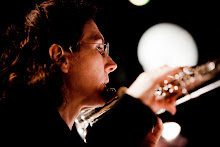Here's some collected advice on how to compose for the bass flute.
For both composers and performers:
To check out solo repertoire you can refer to my repertoire list - scroll to the list of works with piccolo/alto and bass flute. You can also listen to my playing Boulez' Dialogue de l'Ombre Double arranged for bass flute.
Composers:
Please realize that the bass flute is not a true bass instrument. It won't honk unless you amplify it or use its third octave. Both can be very effective, but I often wonder why composers don't take advantage of the beautiful acoustic sound of the instrument's first octave more often. What it lacks in carrying power, it makes up for in soulfulness.
When composing extended techniques - some are very effective! All the percussive tricks like tongue or lip pizzicati and tongue rams work very well in the first octave. Be aware though that they too can get lost in an ensemble situation, especially if you have percussion or bass clarinet also doing slaps. It's difficult to match the dynamic impact of a good bass clarinetist doing slaps.
Key clicks - as with the C flute - fall under my category of "why bother" techniques. I almost always find I need to supplement the key sound with a tongue or lip pizz. They can be effective though if not much else is going on. And please (this is almost a no-brainer, but I have to repeat it all the time) when you write a fast passage, bear in mind that you'll only get key noises on the notes that require you to ADD a finger. Logically, descending passages work better than ascending.
Multiphonics work on the bass flute - fingering charts can be found in Carin Levine's book The Techniques of Flute Playing vol. 2. Basically, you can use most C-flute multiphonics that don't require half-holes. Again, though, there are acoustical considerations. Quiet dynamics, please! with the exception of high overblown harmonics. Multiphonics can be tricky on the bass flute, so don't be disapointed with an airy, unstable result. If that's the effect you wish to create - all the better! To seek a stable, dynamically viable multiphonic, work with the individual player. Each player will have his/her own set of multiphonics which come easier.
It's less of an issue nowadays, but beware that some cheap instruments are still being made without trill keys - so multiphonics using trill keys will not work on them.
Whistle tones work well but are difficult to control. Sweeping through the overtone spectrum on a fingered low note can be effective. Again - as you all probably know - this is easier for the player when it's just an atmospheric effect. Longer notes please! Or if they need to be short, it's best to have a free or undefined rhythm as the response time may vary.
Air/aeolian sounds. This is a great, if perhaps overdone, effect on the bass flute. Toshio Hosokawa uses it often in his ensemble works to good effect. Beware though that young or inexperienced players will need some time to develop when it comes to producing louder dynamics.
Monday, August 17, 2009
Subscribe to:
Post Comments (Atom)


thanks for this, Helen...I had a bass flute session with a composer last week, and had to painstakingly go through such things as why you can't just write a mixed-profile line with key clicks, and why things like tongue stops need to be first-octave-only events. As you speak with such authority, from now on, I'll refer people to your blog post! thanks for the reference to the Levine work also.
ReplyDeleteYou're welcome Tod. If you have anything to add re. bass flute, I'd be happy to publish it here too. I have the feeling this will be a work in progress....
ReplyDeleteThank you for your wonderful comitment to passing on your experience as flutist.
ReplyDeleteIda Helene Heidel
Flutist/composer
Thanks Helen... I am a composer in New York City, and about to write a solo bass flute piece with a few extended techniques (it's actually a movement of a larger work for flute, harp and percussion, but can be played alone), and found your website. This is an invaluable guide, and I will make sure to pass it along to any composers I know who are thinking of writing adventurously for bass flute.
ReplyDelete